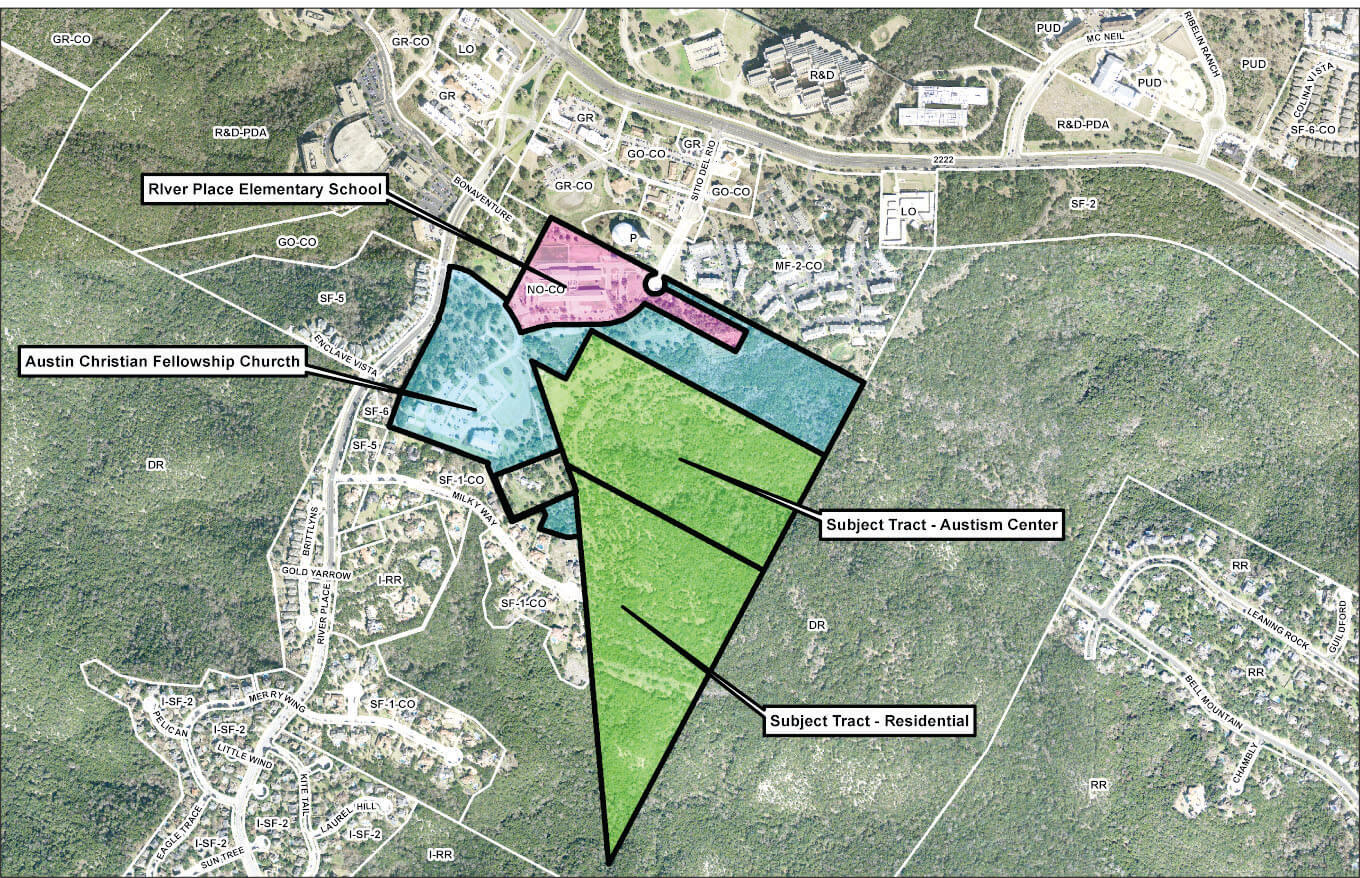By LYNETTE HAALAND
Four Points News
In two zoning cases, Austin’s Zoning and Platting Commission last week voted in favor of the rezoning request for the Autism Trust’s 40-acre site in River Place, and against the MileStone Community Builders request for zoning that would allow them to build a higher density of homes on the adjacent 42-acre site.
“We are disappointed with the vote. This definitely puts the future of the Autism Center Austin in jeopardy,” MileStone Community Builders said in a statement. “We are going to work hard to find a solution so we can build homes families can afford and a desperately needed center for adults with autism.”
MileStone requested a SF-2 zoning to build 82 homes, each worth between $700,000 to $900,000, on 42 acres, to be sold by longtime land owner Berta Bradley.
But on Feb. 21, the Zoning and Platting Commission voted 6-4 to approve the city staff recommendation for SF-1 conditional overlay zoning on the 42-acre site with a minimum lot size of 30,000-square-feet.
For perspective, the lot size of 30,000-square-feet (or the equivalent of nearly 2/3 the size of a football field for each home) exceeds the standard minimum lot size for SF-1 zoning, which is 10,000-square-feet.
Ted Gaunt, who lives on Milky Way Drive which is adjacent to the proposed MileStone housing site, said that the zoning commission sent a “clear signal” to accept the staff recommendation and neighborhood position.
“These conditions grant SF-1 conditional overlay which effectively limits the site to about 45 homes,” Gaunt said. “This is about 20 more than we want, but as a concession, it is a reasonable middle ground.”
“We are not telling MileStone what size homes to build, or how to price them – just simply looking to be smart and balanced about the number of homes in this last-build location in River Place,” Gaunt added.
Scott Crosby, president of the River Place Homeowners Association, echoed those thoughts.
“We are certainly glad that a majority of the commissioners agreed with the staff recommendation and adhered to basic zoning principles in making their decision on the MileStone development.”
Gaunt said that River Place residents showed no opposition to the Autism Trust zoning, which allowed the group to get the exact zoning they asked for.
The Autism Trust zoning request was for the conditional overlay prohibiting, or making conditional, certain uses outlined in the report, limiting vehicle trips per day and prohibiting access to Milky Way Drive.
The two sites combined equal 82 acres which are owned by Berta Bradley. It is the land where her family lived for many decades along with their son, Kent, who has autism and who is now 47-years-old.
MileStone presented its plan that proceeds from the sale of the homes on the proposed 42-acre site would go towards funding the construction of the Autism Center Austin and its initial building on the adjacent 40 acres.
MileStone’s plan would also help endow the Autism Trust. This endowment would be millions of dollars, and would be combined with revenues and donations to the Autism Center to keep the center operating, expanding and growing. Revenue would also be generated for the endowment from various sources, including renting to health care professionals that care for individuals with Autism, to families with autistic children in residence, and to families visiting the center on a short-term basis to learn how to better care for their children without the need for over-medication, which is a common problem in the care of individuals with Autism.
To achieve these objectives, the MileStone plan called for new homes that would have equal or less density than the majority of homes in the River Place development. Accordingly, MileStone sought the SF-2 zoning, which would provide greater building flexibility and ensure the construction of the Autism Center. Additionally hundreds of homes in River Place are also zoned SF-2, the builder said.
According to MileStone, ZAP technically approved the rezoning of the 42 acres for MileStone’s property to enable the construction of far fewer homes, but they did so also knowing that the density they approved would be too low for the project to succeed. The builder looks at this as effectively a vote against the MileStone plan and the construction of the Autism Center.
MileStone also believes that the ZAP Commission purposefully split the cases, over its objection. In doing so, they gave themselves the political cover to vote for the zoning for the Autism Center tract, but against the number of homes needed in order to build the Center. The residential project is necessary to help bring the Autism Center to fruition.
But Crosby at the River Place HOA sees it differently.
“MileStone alleges the Autism Trust and MileStone development zoning cases should have been decided together but this was simply an attempt to get a zoning variance by making their contribution to the Autism Trust contingent upon approval of zoning for 82 homes,” Crosby said.
“I do take exception to our neighborhood be labeled as a ‘wealthy exclusive suburban enclave’ by MileStone, and as ‘evil’ … for not supporting MileStone’s request,” Crosby added.
Gaunt agrees that MileStone is using “very disparaging language” against River Place in this process. Additionally, Gaunt said that MileStone said some conflicting things during the hearings.
“They claim that their philanthropy justifies their request for special building privilege. It is clearly just a tactic to attempt to push for higher margins with more buildings,” Gaunt said.
As evidence of this, Gaunt said, MileStone’s lawyer said at the hearing that if they don’t get 82 homes on 42 acres, that they’ll just have to take the land from the Autism Trust and build 82 homes on the full 82 acres.
“This raises many questions about MileStone’s motives,” he said.
MileStone said its next steps are to continue with community dialogue and outreach and to eventually seek City Council consideration.


